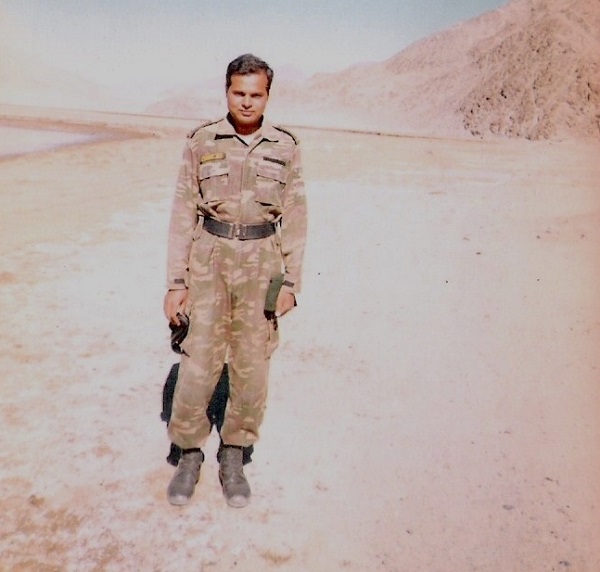New Delhi, (Samajweekly) It was not just infantry. It is not just armoured Corps. Indian Army medical corps in Kargil conflict in 1999 played a crucial role to relieve the soldiers’ physical sufferings, and heal their wounds.
During the conflict, Colonel (then Captain) Vijay Kumar, who was awarded Sena Medal, was posted as the Regimental Medical Officer of an Infantry Battalion at a location along the Srinagar-Leh Highway, when he received a message that his unit was moving to the Dras sector on May 8, 1999 to evict Pakistani intruders.
On the occasion of 22nd Kargil Vijay Diwas on Monday, he recalled that when he was moving towards the Line of Control with the Alpha Company of his battalion on May 27, 1999, they suddenly came under intense fire from the enemy by heavy weaponry and artillery shelling.
Many soldiers of Alpha company got injured and sustained multiple splinter injuries including one fatal case. One of the young soldiers lost both his hands and was bleeding profusely. He became unconscious due to the shock when he was attended.
Then Captain Vijay Kumar and his unit Battlefield Nursing assistant shifted the patient behind some rocks to cover him from incoming enemy fire, as the engagement was still going on from both the sides.
He managed to stop the bleeding by applying compression bandages on both hands and further administered IV fluids to manage the shock.
Afterwards, they shifted the injured soldier along with others to the next medical echelon by stretcher-bearer till the roadhead and thereafter by ambulance. He was then airlifted to a Forward Surgical Centre (FSC) and survived because of his strong will to live and timely medical management in the battle area.
During the war, he managed casualties in a rugged high altitude area with no cover, especially under heavy enemy fire and artillery shelling under challenging and extreme weather conditions.
Colonel (then Captain) Rajesh Adhau, Sena Medal feels nostalgic while remembering the first day of climb during the battle for point 5140, when he and his then 2IC (Later Commanding Officer) were moving towards Hump area; creeping towards their target inch by inch.
While he was completely exhausted and wanted to halt near a big boulder, his 2IC (– Lt. Col YK Joshi — Now Lt. Gen YK Joshi) told him not to stop and pushed him further ahead. After walking about 50 metres, he saw an artillery shell exploding on the same rock where he had intended to stop.
Already horrified, he thanked God and Lt. Col YK Joshi who did not let him stop.
Similarly, Colonel Adhau faced many such incidents during the course of the conflict but he fondly remembers one incident in which when he was at Tololing complex and one of his jawans from the mess staff had recently got married.
During a chat with him, he asked: “Why are you joining the front line? You should be amongst the administrative party!”
The brave lad replied: “Sir, fighting the enemy is my final Dharma! I have to fight against the enemy!”
After two hours, he received an unfortunate call informing him of his unit’s first casualty by gunshot wound in the forehead. It was the same jawan with whom he had spoken a couple of hours back.
He was completely shattered after hearing this and later when Captain Vikram Batra made the supreme sacrifice, Captain Adhau himself lifted his mortal remains and was in a state of “extreme sadness”.
Col Adhau has been an active member of National Service Scheme (NSS) during his college days and NCC in school days which made him inclined towards service for mankind but he had never really thought of joining the Army.
“The war scene is dreadful as one is surrounded by casualties, catastrophe, fear of impending death; that is natural but as they say – courage is to hold on a minute longer – and the true gallant, valour and zeal to defeat the enemy which had encroached our land with wrong intentions was far more motivating than the war scene and its after effects,” says the Kargil hero Colonel (then Captain) Vishal Vir Sharma, Sena Medal.
Every passing day was creating epochal stories of heroism of soldiers and officers that motivated him to give his best. He decided to move with them to the war zone in the middle of battle.
During the war, doctors become immune to patients after a point of time, however every patient in himself is a new case to be dealt in a meticulous and systematic manner. There is no tailor-made treatment for a prototype of cases. Every patient is a challenge for a doctor.
One particular incident which Colonel Vishal can never forget in his life was that of Captain Anuj Nayyar, 2IC of ‘C’ Coy, who laid down his life for the territorial integrity of the nation on July 7, 1999.
It was an unforgettable sight when mortal remains of Captain Anuj Nayyar were brought down from Point 4875 to Battalion headquarters. Everyone was shattered on untimely demise of brave, valiant and gallant officer. And Col Vishal was distraught when sending Captain Nayyar’s mortal remains to his home.










